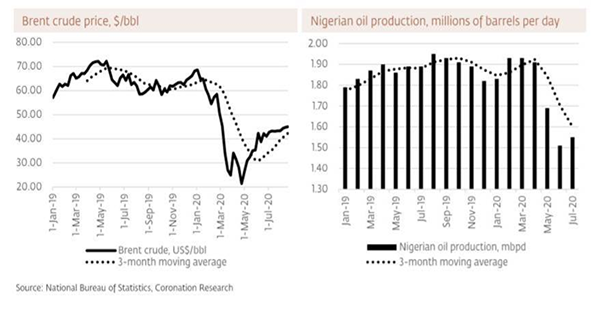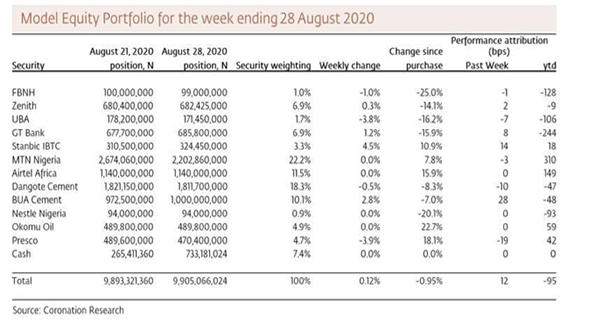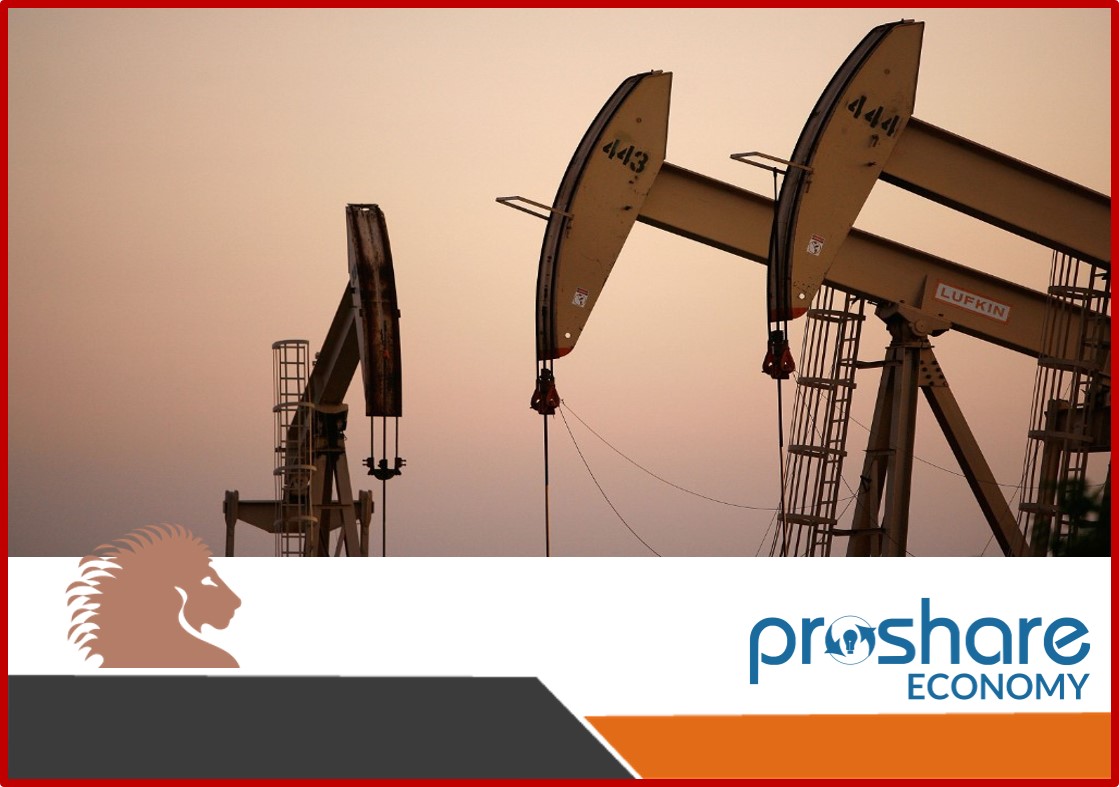Tuesday,September 01, 2020 / 01:06 PM / By Coronation Research /Header Image Credit: CNN Business
Nigeria's public finances work well when oil pricesare above US$50.00/bbl (better still, above US$60.00/bbl). Though prices aretrending in that direction the prospect the Democratic Party winning November'spresidential election puts a question mark over the trend next year. Andthe Organization of the Petroleum Exporting Countries (OPEC) insists on Nigeriacutting its production as prices rise. Nigeria's reliance on oil is underthe spotlight again.
FX
Last week the FX reserves of the Central Bank ofNigeria (CBN) increased by 0.2% week-on-week to close at US$35.66bn, the firstaccretion since May. On the other hand, the overall trend in the CBN's reserveshas been a gentle downwards slope from US$36.67bn reached at the beginning ofJune. This is consistent with a policy of maintaining reserves, as much aspossible, while not supplying as many US dollars to the NAFEX market (where theNaira closed at N385.76/US$1 last week) as it did before March. The CBNannounced that it will resume selling US dollar to Bureaux de Change (BDC) on31 August at the official rate in an attempt to influence the parallel marketexchange rate, which closed at N477/US$1 last week. In our view, the success ofthis move will depend on how many US dollars the CBN is willing to sell and howwell it can monitor the BDC's own rates to prevent arbitrage.
Bonds & T-bills
Last week the secondary market yield for an FGN Nairabond with 10 years to maturity increased by 24 basis points (bps) to 9.00%, andat 3 years decreased by 34bps to 5.29%. The annualised yield on 363-day T-billincreased by 84bps to 3.18% while the yield of a CBN Open Market Operation(OMO) bill with similar tenure decreased by 47bps to 3.74%. At the primarymarket auction last week, the Debt Management Office (DMO) rolled over maturingT-bill worth N197.60bn (US$513.2m) across different maturities - N20.37 billionfor the 91-day, N55.85 billion for the 182-day and N121.38 billion for the365-day T-bills. Despite the rises in rates last week, our sense is that highinflows of liquidity due in September will keep market interest rates trendingdownwards.
Oil
The price of Brent crude increase by 1.58% last weekto US$45.05/bbl. The average price, year-to-date, is US$42.60/bbl, 33.63% lowerthan the average of US$64.20/bbl in 2019. Last week, the increase in oil priceswas caused by a mix of factors: first, a reduction in oil supply due tohurricane Laura which caused US oil producers to shut down some of theirfacilities; second, an demand for crude oil as more COVID-19 restrictions arelifted around the world. We see oil prices trending gently upwards from here.
Equities
The Nigerian Stock Exchange All-Share Index (NSE-ASI)gained 0.35% last week. The year-to-date return is negative 5.71%. Last week PZCussons (+9.09%), Unilever Nigeria (+7.53%), FCMB Group (+5.91%), Stanbic IBTC(+4.49%) and International Breweries (+2.78%) closed positive, while GuinnessNigeria (-6.91%), Presco (-3.92%), UBA (-3.79%), Fidelity Bank(-3.22%) andAccess Bank (-1.54%) closed negative.
Nigeria's Oil RevenueParadox
The presidency of Donald Trump has seen US oilproduction rise from 8.8 million barrels per day (mbpd) in January 2017 to apeak of 13.1mbpd in March of this year, before slumping to 10.8mbpd in August.If Joe Biden becomes President of the United States in January 2021 America'spolicy towards oil is likely to change. Mr. Biden wishes to become a greenpresident, and intends to re-sign America to the Paris Climate Agreement and toput her on track to be carbon emissions net-zero by 2050.
Although none of these policies would have animmediate impact on oil prices Mr. Biden also intends to sign a nuclear dealwith Iran, which could enable the country to vastly increase its oil exports.Under US sanctions Iranian oil production has fallen from an average 3.8mbpd in2017 to 2.0mbpd so far in 2020. A change of 1.8mbpd is significant in thescheme of global production and supply (which was roughly 100.0mbpd at thebeginning of this year). So, a Biden presidency could bring about downwardpressure on oil prices next year.
What about the near-term, i.e. from now until the endof the year? It was clear, in early March, that OPEC and Russia (known as OPEC+)wanted to crash oil prices in order to drive out of business part of US shaleproduction. However, by mid-April, OPEC+ had agreed to production cuts in orderto stop oil prices becoming too low for their liking. Nigeria, as an OPECmember, was due to take its share of the cuts, too.

At the end of July Nigeria's quota was set at 1.4mbpd,compared with production that had recently peaked at 1.9mbpd. In other words,Nigeria is being asked to forgo up to 26% of its production, significant for aneconomy in which (in good times) oil supplies 90% of its exports and around 60%of government revenues. This brings a fresh perspective to recent gains in oilprices. Although prices (Brent) are sharply up from the low level (ofUS$19.33/bbl) reached in April, the rate of climb since the end of June (whenit closed at US$41.15/bbl) has been slow, reaching US$45.05/bbl at the end oflast week.
We would not argue with a forecast that puts oiltrading at around US$50.00/bbl by the middle of Q4 2020. In the past we haveseen how this price level positively affects international investors' appetitefor Nigerian assets, by which we mean Eurobonds, the open market operation(OMO) bills of the CBN and Naira-denominated bills and bonds issued by theFederal Government as well as by the private sector. However, Nigeria needsboth a firm oil price and high levels of production, and this combination mayremain elusive for a while.
Model Equity Portfolio
Last week the Model Equity Portfolio rose by 0.12%,compared with a rise in the Nigerian Stock Exchange All-Share Index (NSE-ASI)of 0.35%, therefore underperforming it by 23 basis points. Year-to-date it haslost 0.95%, against a loss of 5.71% in the NSE-ASI, outperforming it by 476bps.
For the third week in a row we have foundconsumer-facing industrials and brewers rallying: we do not like these stocksand do not hold them. Some of these are not very liquid, so a little buying canmake their prices move a lot. Last week (as featured on page 1) it wasthe turn of PZ Cussons Nigeria, Unilever Nigeria and International Breweries torally. We are not tempted to chase them.
On the other hand, it does make us think againabout the direction of the market. If investors are focusing on the stocks withlow index weights, then this implies relatively less interest in the largestocks in which - for the most part - the Model Equity Portfolio isconcentrated. Our concern is that, once investors are done with thestocks with low index weights, they may want to take profits from the market asa whole. And our model portfolio is highly exposed to the market as awhole.

We do not set ourselves the task of predictingwhich way the market will go from month to month, still less from week toweek. We make notional purchases of stocks which we like, and we timethese purchases when valuations are below their long-term historicalaverages. We also buy themes such as currency depreciation (hence ourpositions in Okomu Oil and Presco which produce commodities with US dollar-relatedprices). And we aim to outperform the market over time.
Our point is that, overall, our strategy is workingout, and therefore it is important not to change it, even when we see stockswhich we do not like rallying. We need to be patient, but not stubborn. If themarket show signs of cracking then we are prepared to take bets off the table(and, as ever, we will warn our readers in advance of making notional trades).We are casting around for new themes to carry us into September and will reportback.
Related News
- PMI Reading No 89: Marginal Slip, Still Positive
- The Nigerian Digital Economy
- August PMI Shows Economic Activities Still in Contraction Amid Slow Recovery - PFI Capital
- Capital Inflows Plummet as The Coronavirus Bug Bites Down Hard on Economic Outlook
- FAAC Disburses N606.19bn in May 2020 - NBS
- PMI: Sustained Recovery in Activities Albeit Readings Still Below Water
- Total Value of Capital Imported into Nigeria Stood At $1,294.94m in Q2 2020 - NBS
- A Feeble Post-Lockdown Bounce
- NBS Publishes COVID-19 Impact Monitoring Survey Report for July 2020
- Nigeria Faces Severe Stagflation as GDP Declines, Unemployment and Inflation Rise
 Lagos, NG • GMT +1
Lagos, NG • GMT +1











 1269 views
1269 views










 Sponsored Ad
Sponsored Ad
 Advertise with Us
Advertise with Us









